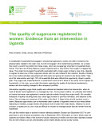Bundling cash loans with agricultural input loans for farmers in Nigeria: A pilot study
Ambler, Kate · Balana, Bedru · Bloem, Jeffrey R. · Maruyama, Eduardo · Olanrewaju, Opeyemi
Dec 2023 · Intl Food Policy Res Inst
Ebook
5
Pages
family_home
Eligible
info
reportRatings and reviews aren’t verified Learn More
About this ebook
Credit allows borrowers to access funds required to make an investment before returns materialize. For smallholder farmers, who must invest in agricultural inputs (i.e., seeds, chemicals, equipment, land, and labor) during the planting season before earning income from the sale of agricultural produce after harvest, credit helps alleviate liquidity constraints and promotes the ability of local agricultural production to support nutrition and food security. In rural Nigeria, access to credit—especially formal credit from financial institutions—is limited. Data collected in 2020 show that less than a third of households in rural Nigeria report using credit in the previous 12 months and only two percent of rural households borrowed credit from a financial institution. The rest is borrowed informally from friends, family, or local money lenders.
In the absence of credit, smallholder farmers must cover the costs of agricultural production with their own funds that they have available during the planting season. This constrains agricultural production and contributes, in part, to the large gaps in agricultural productivity between high-income and low-in come countries around the world.
Rate this ebook
Tell us what you think.
Reading information
Smartphones and tablets
Install the Google Play Books app for Android and iPad/iPhone. It syncs automatically with your account and allows you to read online or offline wherever you are.
Laptops and computers
You can listen to audiobooks purchased on Google Play using your computer's web browser.
eReaders and other devices
To read on e-ink devices like Kobo eReaders, you'll need to download a file and transfer it to your device. Follow the detailed Help Center instructions to transfer the files to supported eReaders.




